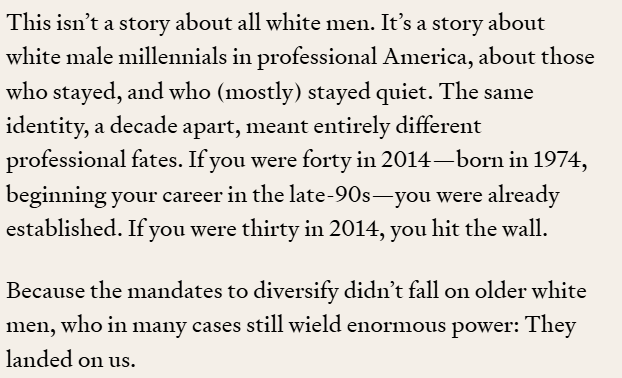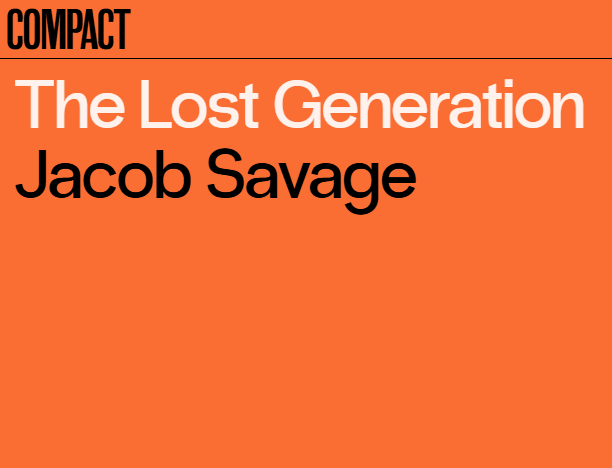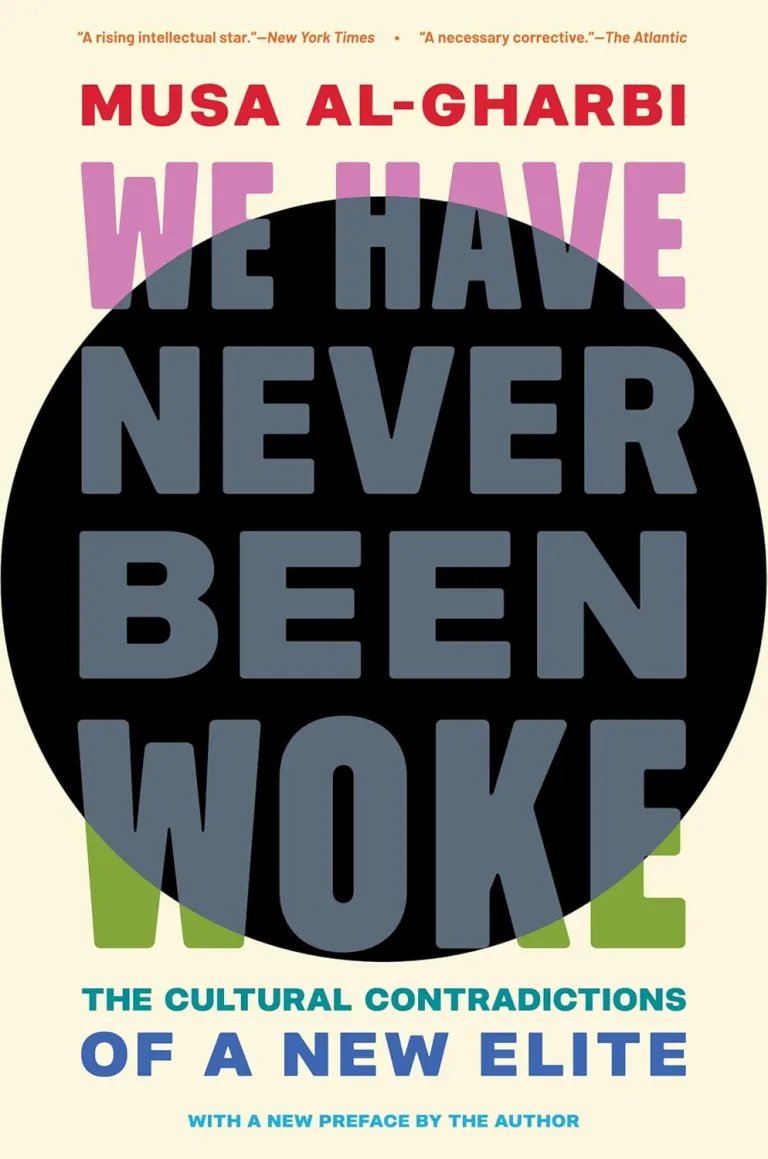
Asst. Professor @SBUjournalism. Author, "We Have Never Been Woke: The Cultural Contradictions of a New Elite" (now available in stores, from @PrincetonUPress)
How to get URL link on X (Twitter) App


 Daniel Bell is my intellectual great-grandfather. He advised my advisor's advisor:
Daniel Bell is my intellectual great-grandfather. He advised my advisor's advisor: 


 As the piece does note (albeit in the background a bit), the Awokening period was tough for *all* symbolic capitalists' employment prospects. As I detail in my book (Chapter 2), Awokenings tend to take off during periods when elite overproduction is especially acute:
As the piece does note (albeit in the background a bit), the Awokening period was tough for *all* symbolic capitalists' employment prospects. As I detail in my book (Chapter 2), Awokenings tend to take off during periods when elite overproduction is especially acute: 

 The fact that @TheDemocrats won the NYC municipal elections should surprise no one. Since 1932, for instance, there have been 26 mayoral elections. Republicans have won 7 of them. The last three consecutive contests went to Democrats by 2:1 margins: musaalgharbi.substack.com/p/a-graveyard-…
The fact that @TheDemocrats won the NYC municipal elections should surprise no one. Since 1932, for instance, there have been 26 mayoral elections. Republicans have won 7 of them. The last three consecutive contests went to Democrats by 2:1 margins: musaalgharbi.substack.com/p/a-graveyard-…

 So, one thing that separates WHNBW from many other books charting the culture wars is that it spends precisely zero time trying to genealogize, taxonomize, or evaluate the correctness of "woke" theorists or ideas.
So, one thing that separates WHNBW from many other books charting the culture wars is that it spends precisely zero time trying to genealogize, taxonomize, or evaluate the correctness of "woke" theorists or ideas. 


 One thing that's critical for understanding how intelligence and education relate to political beliefs and behaviors is to recognize that our cognitive and perceptual systems are wired primarily to help us enhance our status and further our goals. We perceive and think about the world in fundamentally self-interested ways: musaalgharbi.substack.com/p/smart-people…
One thing that's critical for understanding how intelligence and education relate to political beliefs and behaviors is to recognize that our cognitive and perceptual systems are wired primarily to help us enhance our status and further our goals. We perceive and think about the world in fundamentally self-interested ways: musaalgharbi.substack.com/p/smart-people…

 Let's start with race: Democrats saw gains with white people this cycle. Harris did about as well with whites as Democrats typically do. She saw improvement with whites across gender lines relative to 2020: musaalgharbi.substack.com/p/a-graveyard-…
Let's start with race: Democrats saw gains with white people this cycle. Harris did about as well with whites as Democrats typically do. She saw improvement with whites across gender lines relative to 2020: musaalgharbi.substack.com/p/a-graveyard-… 


 One of the first things that jumps out at you reading the book is how much the first Awokening has in common with the current one: musaalgharbi.substack.com/p/book-review-…
One of the first things that jumps out at you reading the book is how much the first Awokening has in common with the current one: musaalgharbi.substack.com/p/book-review-…


https://twitter.com/TheAtlantic/status/1852322647289303464
 It's sad that they can't even be perceived neutral when journalists are rabidly clamoring for a political endorsement of the Democratic nominee, and the paper itself quite explicitly defined itself in opposition to Trump since 2016.
It's sad that they can't even be perceived neutral when journalists are rabidly clamoring for a political endorsement of the Democratic nominee, and the paper itself quite explicitly defined itself in opposition to Trump since 2016. 




 Let's start by disabusing readers of one storyline about why the @GOP is unlikely to receive the black vote share that current polling suggests: Kamala's race.
Let's start by disabusing readers of one storyline about why the @GOP is unlikely to receive the black vote share that current polling suggests: Kamala's race. 



 Let's start with #gender: Prior to the Great Awokening, only about 4 percent of title had exclusively female characters. By 2015, that number had doubled. By 2020, *that* number had doubled:
Let's start with #gender: Prior to the Great Awokening, only about 4 percent of title had exclusively female characters. By 2015, that number had doubled. By 2020, *that* number had doubled: 



 Some baseline facts: as my own work for @HdxAcademy shows, the professoriate is highly unrepresentative of U.S. society overall along many dimensions, including and especially along ideological lines:
Some baseline facts: as my own work for @HdxAcademy shows, the professoriate is highly unrepresentative of U.S. society overall along many dimensions, including and especially along ideological lines: 

 IDF representatives have repeatedly boasted about Israel's precise targeting capabilities. This raises troubling questions about the extraordinary level of killing of people who should be protected under international law: compactmag.com/article/israel…
IDF representatives have repeatedly boasted about Israel's precise targeting capabilities. This raises troubling questions about the extraordinary level of killing of people who should be protected under international law: compactmag.com/article/israel…

 In the immediate aftermath of the #HamasMassacre, many circulated false, unsubstantiated or misleading claims w/ a clear intent of driving support for rapid and aggressive violence against #Gaza, #Iran, #Hezbollah + others: thenation.com/article/world/…
In the immediate aftermath of the #HamasMassacre, many circulated false, unsubstantiated or misleading claims w/ a clear intent of driving support for rapid and aggressive violence against #Gaza, #Iran, #Hezbollah + others: thenation.com/article/world/…




 As @leedrutman illustrated, we can divide the American electorate into four quadrants based on their cultural and economic leanings. The quadrant he labels as "populist" (economically left, culturally right) is not well represented by either party: cnn.com/2023/09/26/opi…
As @leedrutman illustrated, we can divide the American electorate into four quadrants based on their cultural and economic leanings. The quadrant he labels as "populist" (economically left, culturally right) is not well represented by either party: cnn.com/2023/09/26/opi…


 There is a robust and ever-growing pool of evidence showing that many of the DEI initiatives being defunded by DeSantis et al. are not just ineffective relative to their stated goals, they're actively pernicious: musaalgharbi.com/2020/09/16/div…
There is a robust and ever-growing pool of evidence showing that many of the DEI initiatives being defunded by DeSantis et al. are not just ineffective relative to their stated goals, they're actively pernicious: musaalgharbi.com/2020/09/16/div…